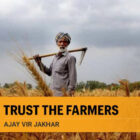Farmer organisations can play a positive role only if they serve the farming communities interests, irrespective of political affiliations and vested ideologies.
While trying to compile a list of sufferings inflicted on farmers, one is left wondering if there exists a magic pill that can solve their problems,” says Mr Ajay Vir Jakhar, Chairman, Bharat Krishak Samaj, New Delhi. The bane of the farmers “is that they vote on caste or religious lines, nudged by political leaders and later expect the government to deliver their needs as a community of farmers. Unfortunately, today, there is a dearth of farmer leaders in all-political parties. Leaders represent their own individual communities and castes to win their elections,” he says.
Need for awareness
Surprisingly, more than a farmer, it is the policy-makers who need to be educated, especially on marketing, because their decisions determine a farmer’s future. “Over the years, a number of farmer organisations are becoming either offshoots of political parties or politically aligned. As a consequence, these become mouthpieces of political groups,” Mr Jakhar adds.
Depending on the party that the organisation is affiliated to, as is usually the case, an organisation becomes more active during opposition rule. This makes several groups inherently seasonal in its agitations to channelise pent up frustration and anger against the government of the day,” he explains. “At no point, however, should this be mistaken to represent absence of good organisations.”
There are several organisations doing a good job but are less known because they work for the welfare of farmers and are not in the business of publicity. These groups are nearly lost in the vast ocean of namesake farmers’ welfare organisations, according to Mr Jakhar.
Futile protests
“Everyone criticises aloud to get noticed,” he emphasises. Undoubtedly, criticism is valuable; it gets public attention, increases TV ratings, garners support and eventually money and position. At most seminars, farmer meets, and debates on agriculture, there are people projecting themselves, highlighting faults in sight. Positive discussions are a rarity, he says.
“Even though most agitations holding up the roads and blocking traffic are for farmer-related causes, they do not achieve much. The farmers in the U.S. wield more influence on the government policy because they are better organised to look after their own interests,” he says. Though 70 per cent of the farmers in India are women, very few admit women members and even fewer shoulder constitutional responsibilities in their respective setups.
Farmers’ organisations can play a vital role on two fronts: first by enlightening the farmers about wrong policies affecting them; and second, by disseminating information on the best available agriculture practices so that the farmer can make an informed decision for adoption.
Effective communication
The value of good communication, pressurising policymakers, generating awareness and providing information access to farmers cannot be underestimated, according to Mr Jakhar. “It becomes difficult to evaluate resultant gains or quantify the benefits. Funding obviously remains a major hurdle for those doing good work,” he adds.
The Panchayati Raj today acts like a double-edged sword — providing much needed empowerment and benefits to the rural community on the one hand, but destroying the social harmony in the villages, on the other.” It serves to divide farmers on political lines by pitting one against the other in every street, to the point that farmer solidarity may be lost forever,” regrets Mr Jakhar.
There are many ways that farmer organisations can play a positive role to ease the farmers’ endless suffering if only they vote on issues that benefit the farming community, irrespective of political affiliations, rather than on vested ideologies, local and sectarian interests, Mr Jakhar says.




